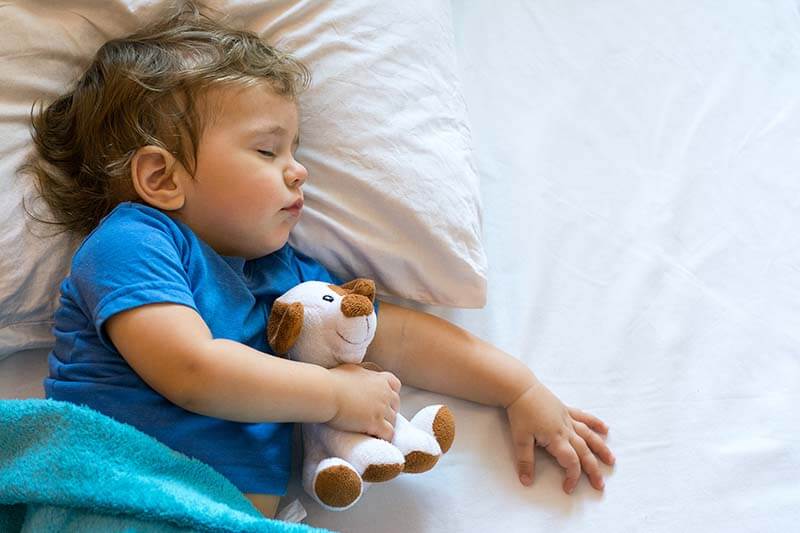
Sleep for children
Sleep plays a crucial role in children's overall health and development. Establishing and maintaining healthy sleep routines is crucial for children's overall health and well-being. It not only contributes to their physical and cognitive development but also supports a positive and balanced emotional state.
But we all know that sleep can be a source of problems for many children and their families. We have products that can help you fall asleep more easily, sleep more comfortably and have a calmer day.

Children's important sleep
Sleep is particularly important for children because it is during sleep that the body and brain grow and develop. During sleep, growth hormones are produced to help the body grow and develop. This is particularly important for babies and young children who are growing rapidly. Sleep also plays an important role in cognitive development. It helps the child to process and consolidate information that they have learned during the day. Sleep deprivation has been shown to affect children's learning, memory and attention.
Sleep also affects children's regulation of mood and behavior. Lack of sleep can lead to irritability, hyperactivity and mood swings. Sleep plays an important role in the immune system by helping the body fight infections and diseases. Children are more susceptible to infections because their immune systems are not yet fully developed, so sleep is particularly important to keep them healthy. Sleep is also important for maintaining physical performance and energy during the day.
Lack of sleep can lead to fatigue and reduced performance during the day, which can affect children's performance in school or sports activities.
Children and weighted duvets
Baby duvets can work wonders for both the child and the parents. Designed to provide even pressure across the body, weighted duvets can provide a sense of calm and security. They are often used to help people relax and improve sleep. For children with NPD diagnoses, the use of weighted duvets has shown good results in terms of falling asleep and increased calmness during the night.
But there are some things that are important to keep in mind:
Weight recommendations: The weighted duvet should weigh approximately 10-12% of the child's body weight. This is a general guideline, and it is important to consult with a doctor or a specialist at sovmer to get personalized advice.
Age and maturity: weighted duvets are usually more suitable for older children, as younger children may not be as aware of how to handle the weight or have the ability to communicate if they feel discomfort. It is important to monitor the child to see how they react to the weighted duvet. Therefore, we do not recommend weighted duvets for children under the age of 3.
The benefits of sleep:
-
Physical growth and development: During sleep, growth hormones are released, which are crucial for children's physical development and growth. An adequate sleep period allows the body to repair and rebuild tissue, muscles and bones.
-
Cognitive development and learning: Sleep plays a key role in cognitive development and learning. During sleep, memories are consolidated, and the brain processes and organizes information. Children who get enough sleep often have better concentration, memory and problem-solving skills.
-
Emotional health and regulation: Sleep affects children's emotional health and ability to regulate their emotions. Insufficient sleep can lead to increased irritability, mood swings and reduced tolerance to stress. A stable sleep cycle helps to promote a positive emotional balance.
-
Immune system and health: Sleep is an important factor in strengthening the immune system. Children who get enough sleep are usually better able to fight infections and diseases. A regular sleep cycle promotes overall health and well-being.
-
Prevention of obesity: Research suggests that insufficient sleep may be linked to an increased risk of overweight and obesity in children. Sleep deprivation can affect hormone regulation and increase the risk of overeating.
-
Energy levels and behavior: Children who get enough sleep tend to have better energy levels and are more likely to participate in physical activities. At the same time, lack of sleep can lead to fatigue, reduced energy and affect the child's behavior and participation in daily activities.

How much sleep does the child need?
Here are some general guidelines depending on the age of the child:
- Newborns (0-3 months): 14-17 hours per day.
- Infants (4-11 months): 12-15 hours per day.
- Toddlers (1-2 years): 11-14 hours per day.
- Preschoolers (3-5 years): 10-13 hours per day.
- School age (6-13 years): 9-11 hours per day.
- Teenagers (14-17 years): 8-10 hours per day.

